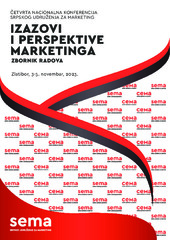Please use this identifier to cite or link to this item:
https://rfos.fon.bg.ac.rs/handle/123456789/2635| Title: | OTKRIVANJE FAKTORA KOJI UTIČU NA UČEŠĆE MLADIH U EKONOMIJI DELJENJA U SRBIJI DETECTING FACTORS WHICH IMPACT THE PARTICIPATION OF YOUTH IN SHARING ECONOMY PRACTICES IN SERBIA |
Authors: | Maričić, Milica Drinjak, Nikola Popović, Andrea |
Contributors: | Hanić, Hasan Veljković, Saša |
Keywords: | ekonomija deljenja;ponašanje potrošača;generacija Z;socio-demografski faktori;sharing economy;consumer behaviour;generation Z;socio-demographic factors | Issue Date: | 2023 | Publisher: | Srpsko udruženje za marketing - SeMA | Abstract: | Ekonomija deljenja se smatra savremenim poslovnim modelom koji omogućava deljenje proizvoda i usluga između pojedinaca posredstvom online platformi na određeno vreme, po određenim uslovima i po dogovorenoj ceni. Od kada je koncept prvi put definisan na ovaj način 2010. godine interesovanje kako pojedinaca, tako i donosilaca odluka i istraživača za oblast je u značajnom porastu. Jedno od osnovnih pitanja koje se postavlja je koji su to faktori koji utiču na učešće pojedinca u ekonomiji deljenja, kako i šta se može učiniti kako bi se što veći broj pojedinaca uključio u ovaj koncept. Ovo istraživanje ima za cilj da analizira uticaj sociodemografskih faktora na učešće mladih u ekonomiji deljenja, kao i da sagleda razlike u percepciji čitavog koncepta u zavisnosti od prethodnog iskustva učešća u ekonomiji deljenja. Rezultati ukazuju da stariji ispitanici i oni koji imaju više novca kojim samostalno raspolažu više učestvuju u ekonomiji deljenja. Takođe, pokazano je da su oni koji su učestvovali u ekonomiji deljenja svesni da postoji manjak osiguranja ljudi i dobra u ovom modelu, kao i da oni smatraju da je mogućnost zloupotrebe ličnih podataka veoma mala. Dobijeni rezultati mogu poslužiti prilikom kreiranja kampanja koje imaju za cilj da podignu svest o mogućnostima i beneficijama učešća u ekonomiji deljenja. The sharing economy is considered a contemporary business model that enables the sharing of products and services between individuals through an online platform for a certain period of time, under certain conditions and at an agreed price. Since the concept was first defined in 2010, the interest of individuals, decision-makers and researchers in the field has grown visibly. One of the basic questions that emerges is what are the factors that influence the participation of an individual in the sharing economy, as well as what can be done and in what way to involve as many individuals as possible in this concept. This research aims to analyse the impact of socio-demographic factors on the participation of youth in the sharing economy, as well as to look at the differences in the perception of the whole concept depending on the previous experience with the sharing economy. The results indicate that older respondents and those with higher amounts of money they spend independently participate more in the sharing economy. Also, it was shown that those who participated in the sharing economy are aware that there is a lack of insurance for people and goods in this model, and that they believe that the possibility of misuse of personal data is minimal. The obtained results can be used to create campaigns which aim at raising awareness about the possibilities and benefits of participating in the sharing economy. |
URI: | https://rfos.fon.bg.ac.rs/handle/123456789/2635 | ISBN: | 978-86-903768-2-7 |
| Appears in Collections: | Radovi istraživača / Researchers’ publications |
Files in This Item:
| File | Description | Size | Format | |
|---|---|---|---|---|
| bitstream_3886.pdf | DETECTING FACTORS WHICH IMPACT THE PARTICIPATION OF YOUTH IN SHARING ECONOMY PRACTICES IN SERBIA | 5.54 MB | Adobe PDF |  View/Open |
Page view(s)
4
checked on Dec 28, 2025
Download(s)
6
checked on Dec 28, 2025
Google ScholarTM
Check
Altmetric
This item is licensed under a Creative Commons License

